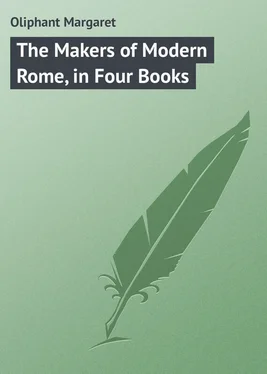Margaret Oliphant - The Makers of Modern Rome, in Four Books
Здесь есть возможность читать онлайн «Margaret Oliphant - The Makers of Modern Rome, in Four Books» — ознакомительный отрывок электронной книги совершенно бесплатно, а после прочтения отрывка купить полную версию. В некоторых случаях можно слушать аудио, скачать через торрент в формате fb2 и присутствует краткое содержание. Жанр: foreign_prose, на английском языке. Описание произведения, (предисловие) а так же отзывы посетителей доступны на портале библиотеки ЛибКат.
- Название:The Makers of Modern Rome, in Four Books
- Автор:
- Жанр:
- Год:неизвестен
- ISBN:нет данных
- Рейтинг книги:5 / 5. Голосов: 1
-
Избранное:Добавить в избранное
- Отзывы:
-
Ваша оценка:
- 100
- 1
- 2
- 3
- 4
- 5
The Makers of Modern Rome, in Four Books: краткое содержание, описание и аннотация
Предлагаем к чтению аннотацию, описание, краткое содержание или предисловие (зависит от того, что написал сам автор книги «The Makers of Modern Rome, in Four Books»). Если вы не нашли необходимую информацию о книге — напишите в комментариях, мы постараемся отыскать её.
The Makers of Modern Rome, in Four Books — читать онлайн ознакомительный отрывок
Ниже представлен текст книги, разбитый по страницам. Система сохранения места последней прочитанной страницы, позволяет с удобством читать онлайн бесплатно книгу «The Makers of Modern Rome, in Four Books», без необходимости каждый раз заново искать на чём Вы остановились. Поставьте закладку, и сможете в любой момент перейти на страницу, на которой закончили чтение.
Интервал:
Закладка:
"What make you in your father's house, oh sluggish soldier?" cried that eager voice; "where are your ramparts and trenches, under what tent of skins have you passed the bitter winter? The trumpet of heaven sounds, and the great Leader comes upon the clouds to overcome the world. Let the little ones hang upon other necks; let your mother rend her hair and her garments; let your father stretch himself on the threshold to prevent you from passing: but arise, come thou! Are you not pledged to the sacrifice even of father and mother? If you believe in Christ, fight with me for His name and let the dead bury their dead." There were many who would dwell upon these entreaties as upon a noble song rousing the heart and charming the ear, but the balance of human nature is but rarely disturbed by any such appeal. Even in that early age we may in the greater number of cases permit it to move all hearers without any great fears for the issue.
Jerome, however, did not himself remain very long in his desert; he was invaded in his very cell by the echoes of polemical warfare drifting in from the world he had left: and was called upon to pronounce himself for one side or the other, while yet, according to his own account, unaware what it was all about. He left his retirement unwillingly after some three years, quoting Virgil as to the barbarity of the race which refused him the hospitality of a little sand, and plunged into the fight at Antioch between contending bishops and parties, the heresy of Apollinaris, and all the rage of religious polemics. It was probably his intimate acquaintance with all the questions so strongly contested in the East, and his power of giving information on points which the Western Council could only know at second hand, which led him to Rome on the eve of the Council already referred to, called by Pope Damasus, in 382. The primary object of this Council was to settle matters of ecclesiastical polity, and especially the actual question as to which of the competitors was lawful bishop of Antioch, besides other questions concerning other important sees. It was no small assumption on the part of the bishops of the West, an assumption supported in those days by no dogma as to the supremacy of the Bishop of Rome, to interfere in the affairs of the East to this extent. And it was at once crushed by the action of the Church in the East, which immediately held a council of its own at Constantinople, and authoritatively decided every practical question. Jerome was the friend of all those bishops whose causes would have been pleaded at Rome, had not their own section of the Church thus made short work with them: and this no doubt commended him to the special attention of Damasus, even after these practical questions were set aside, and the heresy of Apollinaris, which had been intended to be treated in the second place, was turned into the only subject before the house. Jerome was deeply learned on the subject of Apollinaris too. It was on account of this new heresy that his place in Egypt had become untenable. His knowledge could not but be of the utmost importance to the Western bishops, who were not as a rule scholars, nor given to the subtle reasoning of the East. He was very welcome therefore in Rome, especially after the illness of the great Ambrose had denuded that Council, shorn of so much of its prestige, of almost the only imposing name left to it. This was the opportunity of such a man as Jerome, in himself, as we have said, still not much different from the many young religious adventurers who scoured the world. He was already, however, a distinguished man of letters: he was known to Damasus, who had baptized him: he had learning enough to supplement the deficiencies of an entire Council, and for once these abilities were fully appreciated and found their right place. He had scarcely arrived in Rome when he was named Secretary of the Council – a temporary office which was afterwards prolonged and extended to that of Secretary to the Pope himself: thus the stranger became at once a functionary of the utmost importance in the proceedings of the See of Rome and in its development as a supreme power and authority in the Church.
There is something strangely familiar and quaint in the appearance, so perfectly known to ourselves, of the gathering of a religious congress, convocation, or general assembly, when every considerable house and hospitable family is moved to receive some distinguished clerical visitor – which thus took place in Rome in the end of the fourth century, while still all was classic in the aspect of the Eternal City, and the altars of the gods were still standing. The bishops and their trains arrived, making a little stir, sometimes even at the marble porticoes of great mansions where the master or mistress still professed a languid devotion to Jove or Mercury. Jerome, burnt brown by Egyptian suns, meagre and sinewy in his worn robe, with a humble brother or two in his train, accepted, after a little modest difficulty, the invitation or the allotment which led him to the Aventine, to the palace of Marcella, where he was already well known, and where, though his eyes were downcast with a becoming reserve at the sight of all the ladies, he yet felt it right to follow the example of the Apostle and industriously overcome his own bashfulness. It was not perhaps a quality very strong in his nature, and very soon his new and splendid habitation became to the ascetic a home more dear than any he had yet known.
It is curious to find how completely the principle of the association and friendship of a man and woman, failing closer ties, was adopted and recognised among these mystics and ascetics, without apparent fear of the comments of the world, or any of the self-consciousness which so often spoils such a relationship in ordinary society. Perhaps the gossips smiled even then upon the close alliance of Jerome with Paula, or Rufinus with Melania. There were calumnies abroad of the coarsest sort, as was inevitable; but neither monk nor lady seem to have been affected by them. It has constantly been so in the history of the Church, and it is interesting to collect such repeated testimony from the most unlikely quarter, to the advantage of this natural association. Women have had hard measure from Catholic doctors and saints. Their conventional position, so to speak, is that of the Seductress, always studying how to draw the thoughts of men away from higher things. The East and the West, though so much apart on other points, are at one in this. From the anguish of the fathers in the desert to the supposed difficulties of the humblest ordinary priest of modern times, the disturbing influence is always supposed to be that of the woman. Gruesome figure as he was for any such temptation, Antony of Egypt himself was driven to extremity by the mere thought of her: and it is she who figures as danger or as victim in every ultra-Protestant plaint over the condition of the priest (except in Ireland, wonderful island of contradictions! where priests and all men are more moved to fighting than to love). Yet notwithstanding there has been no founder of ecclesiastical institutions, no reformer, scarcely any saint, who has not been accompanied by the special friendship and affection of some woman. Jerome, who was so much the reverse, if we may venture to use these words, of a drawing-room hero, a man more used to vituperation than to gentleness of speech, often harsh as the desert from which he had come, was a notable example of this rule. From the time of his arrival on the Aventine to that of his death, his name was never dissociated from that of Paula, the pious lady par excellence of the group, the exquisite and delicate patrician who could scarcely plant her golden shoe firmly on the floor, but came tottering into Marcella's great house with a slave on either side to support her, in all the languid grace which was the highest fashion of the time. That such an example of conventional delicacy and luxury should have become the humble friend and secretary of Jerome, and that he, the pious solitary, acrid with opposition and controversy, should have found in this fine flower of society his life-long companion, both in labour and life, is more astonishing than words can say.
Читать дальшеИнтервал:
Закладка:
Похожие книги на «The Makers of Modern Rome, in Four Books»
Представляем Вашему вниманию похожие книги на «The Makers of Modern Rome, in Four Books» списком для выбора. Мы отобрали схожую по названию и смыслу литературу в надежде предоставить читателям больше вариантов отыскать новые, интересные, ещё непрочитанные произведения.
Обсуждение, отзывы о книге «The Makers of Modern Rome, in Four Books» и просто собственные мнения читателей. Оставьте ваши комментарии, напишите, что Вы думаете о произведении, его смысле или главных героях. Укажите что конкретно понравилось, а что нет, и почему Вы так считаете.












